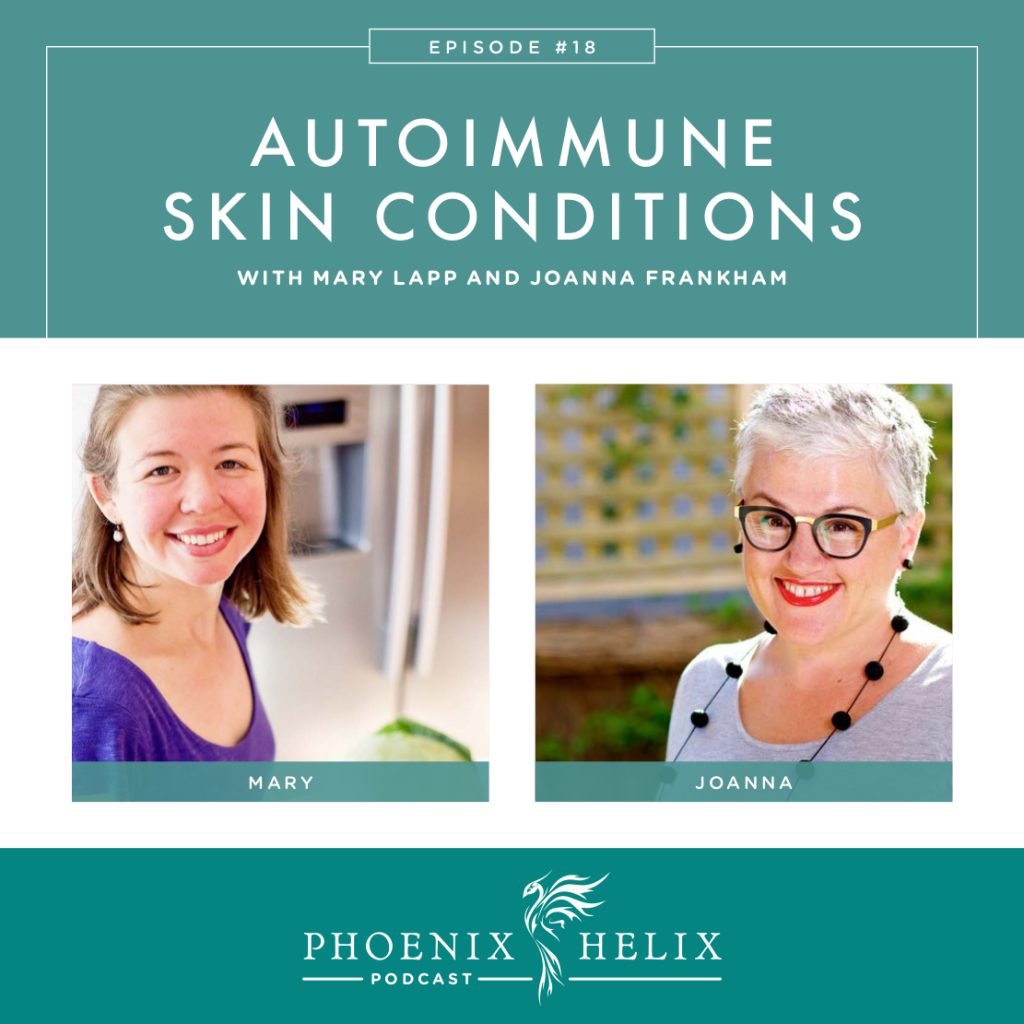
Healing Your Body From The Inside Out
While all autoimmune diseases have common factors (molecular mimicry, an overactive immune system, leaky gut, food and stress triggers, etc.), autoimmune skin conditions sometimes have additional influences. So, that’s the focus of our podcast today. Whether you have psoriasis, eczema, lichen planus, hidradenitis suppurativa, rosacea, or another autoimmune or immune-stimulated condition, listen in! And even if you don’t have skin issues, but are looking for some troubleshooting ideas for symptoms that aren’t resolving quickly, this episode might have the answers you seek.
Listen to the Show
- Subscribe to my podcast through your favorite podcast app: iTunes, Stitcher, Google, TuneIn, Spotify, Amazon, etc.
- You can also listen to the episode right here through the player below, and if you subscribe to my newsletter you’ll get notified of future episodes.
Podcast: Play in new window | Download
Show Notes
- Intro (0:00)
- Meet Our Guests (0:51)
- Joanna Frankham is the blogger and health coach behind Joannafrankham.com (formerly This Sydney Life). She is using the paleo lifestyle to reverse hidradenitis suppurativa (HS). HS is often misdiagnosed and can take 20 years before getting an accurate diagnosis, which was the case for Joanna. In fact, doctors often blame symptoms on poor hygiene, leaving patients feeling unfairly ashamed, having no idea autoimmunity is at its root. HS symptoms are pea-sized lumps under the skin wherever your skin rubs together: armpits, groin, buttocks and breasts. These lumps can come and go, or last for years, and they’re very painful. Joanna finally learned about HS through this article on Mark’s Daily Apple, written by Tara Grant, author of the book, The Hidden Plague. Joanna started with a primal diet and transitioned into the paleo autoimmune protocol (AIP). That combined with functional medicine have reduced her symptoms by 95%.
- Mary Lapp follows the paleo lifestyle to manage rosacea. Rosacea is a skin condition that causes the face to become red, inflamed and bumpy. It isn’t painful, but it’s very visible and often leaves people feeling embarrassed. Mary developed rosacea at around 10 years old and it worsened during puberty. She tried other dietary protocols first which caused her condition to worsen. It wasn’t until she switched to the AIP that it started to improve. She is now 80% better. One challenge for her in staying strict with her diet is that her symptoms aren’t debilitating, so she sometimes eats foods she knows will cause a flare.
- Food Triggers & Reintroductions (11:42)
- Mary: Foods that cause her to flare the most: nightshades, eggs, histamines and sugars (even natural ones). Foods she’s been able to reintroduce successfully back into her diet: white rice, and small amounts of nuts and dairy. Mary mentioned a probiotic that helps her digest histamines better: Seeking Health Probiota 12.
- Joanna: Foods that cause her to flare the most: nightshades. Foods she’s been able to reintroduce successfully: eggs, nuts, seeds, and a small amount of dairy. She also limits sugar.
- Gut Health (19:25)
- Joanna: She was prescribed Accutane for severe acne as a teenager, which is now known to have serious side effects related to gut heath. She believes it might be one of the triggers behind her development of HS. Her functional medicine practitioner tested (and found) parasites as well as severe gut dysbiosis. Treating those conditions improved her health dramatically.
- Mary: Rosacea is closely associated with low stomach acid, which interferes with digestion and leads to pathogenic bacteria overgrowth. She personally notices a direct connection between her digestive health and her skin health. Natural tonics for low stomach acid. Mary also believes that the first step for healthy digestion is in our brain – slowing down, relaxing, and paying attention to what we eat: Mindful eating.
- Functional Medicine Resources: Joanna is a Health Coach, and Mary is a Nutritional Therapy Practitioner. Joanna highly recommends her doctor in Australia who consults with people globally via Skype: Dr. Kate Norris. And here’s a list of directories of paleo physicians and practitioners.
- Stress Triggers (28:13)
- Mary: Stress is a flare trigger for her rosacea. She incorporates the following stress management techniques into her life: deep breathing, EFT/tapping, journaling, prayer, and getting plenty of sleep. Also identifying and addressing the source of the stress.
- Joanna: Stress is her biggest trigger for HS. She reduces her stress through Julia Cameron’s Morning Pages, from her book The Artist’s Way. She also finds walking and playing with her dog to be very relaxing.
- Resource Podcast: Healing Mindset.
- Emotional Triggers (35:24)
- Eileen’s blog post: My Body Is NOT My Enemy
- Mary’s health and nutrition coaching program: Self-Care for Energy.
- Joanna: HS is often a secret condition and one that leaves people feeling ashamed. She has found healing through the AIP to be healing on an emotional level as well as a physical one.
- Sleep and Autoimmunity (40:28)
- Joanna: has worked hard to set up healthy circadian rhythms that support sleep and it’s made a big difference in her health.
- Mary: Recommends essential oils to help go to sleep: lavender, cedarwood, and vetiver.
- Resources: Scientific study on the affect short sleep has on inflammation and immune expression, the Go To Bed Sleep Challenge, and the Circadian Rhythms Podcast.
- Skincare Products (45:19)
- Mary: Most skincare products exacerbate her rosacea, so she has to be very careful. Her favorite moisturizer is Dr. Ron’s moisturizer with CoQ10, but it doesn’t have a healing effect. She focuses on gut health for healing. She also chooses all-natural cleaning products, because they impact her skin as well.
- Joanna: Her experience matches Mary in that she tries to avoid anything unnatural on her skin, but she looks to diet and stress management for healing. She uses rose hip oil on her face, and coconut oil as a moisturizer. She stopped dying her hair. And she uses all-natural cleaning products as well.
- Resource: What Is Paleo Skincare?
- The Impact of Weather and Sunshine (50:49)
- Joanna: It’s possible that heat might exacerbate HS slightly, but overall, she notices no real difference in her symptoms based on weather. She did have chronically low vitamin D and raising that level has improved her health overall.
- Mary: Weather is a huge trigger for her rosacea: too much sun, a harsh wind, too much heat, too much cold. She wears a hat outdoors and finds that helpful.
- Final Words of Wisdom (53:57)
- Mary: Sometimes skin issues can become part of our identity, so that’s part of healing too – getting comfortable with the “new you” as you heal.
- Joanna: Her sister has eczema and her father has psoriasis, so there is a genetic link between different skin conditions, and both her father and sister have experienced improved symptoms with the paleo diet as well.
- Outro (56:19)
- Joanna is launching a health coaching practice, and you can find her at Joannafrankham.com. She also has some wonderful recipes on her website as well.
- Update 2020: Mary has transitioned to a new career and is no longer offering nutrition consulting services.
- Eileen (your podcast host) is the author of multiple books, written to help people thrive with autoimmune disease. Learn more on the Books Page.
- If you like this podcast, follow or subscribe through your favorite podcast app. You can also subscribe to Eileen’s biweekly newsletter.
- Check out the entire archive of podcast episodes.
You May Also Be Interested In
Spreading the Word
If you like the podcast, please leave a positive review in iTunes. It would mean the world to me, and also helps others find the podcast. Here are some quick instructions using your iPhone:
- If you are already subscribed to my podcast: (1) Click the purple podcast icon. (2) At the bottom of the screen, click Library. (3) At the top of the screen, click Shows. (4) Click the Phoenix Helix podcast image. (5) Scroll down the page, and you’ll see Ratings and Reviews. Scroll down a little bit more and click on Write a Review. This will bring up the review screen. Tap 5 stars (if you love the podcast), and then click in the title box, and it will bring up the keyboard. Enter a title and short review. (6) Click Send in the upper right corner. (7) Thank you! Positive reviews give the podcast a higher search ranking in iTunes, helping people find it and letting them know it’s a quality podcast and worth their time to listen.
- If you haven’t subscribed to my podcast: (1) Click the purple podcast icon. (2) In the lower right corner, click the magnifying class. (3) Type Phoenix Helix in the search box. (4) Click the podcast cover in the Show list. (5) If you’d like to subscribe, click the + sign at the top of the screen. (6) To write a review, scroll down the page, and you’ll see Ratings and Reviews. Scroll down a little bit more and click on Write a Review. This will bring up the review screen. Tap 5 stars (if you love the podcast), and then click in the title box, and it will bring up the keyboard. Enter a title and short review. (7) Click Send in the upper right corner. (8) Thank you! Positive reviews give the podcast a higher search ranking in iTunes, helping people find it and letting them know it’s a quality podcast and worth their time to listen.

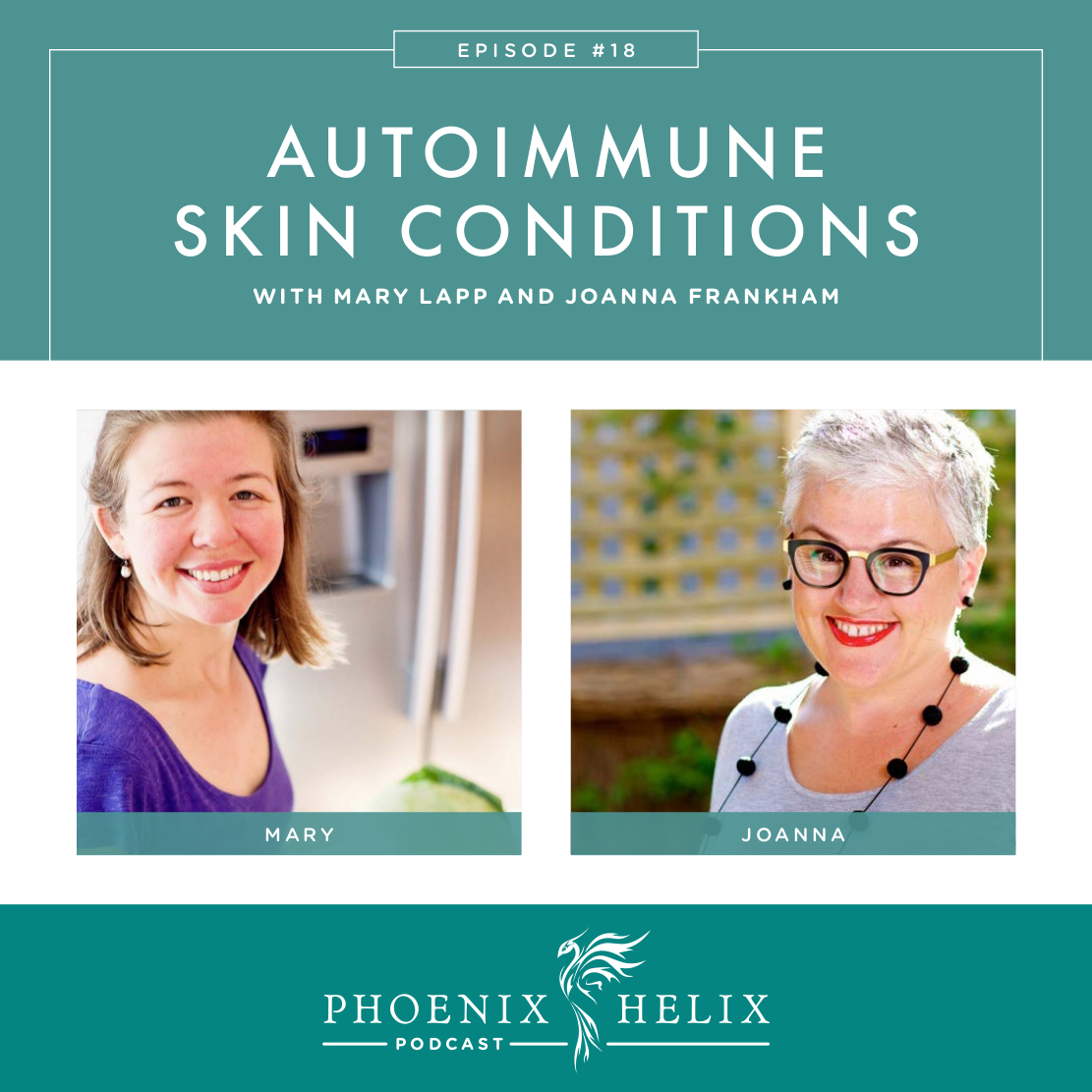
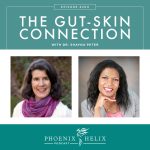
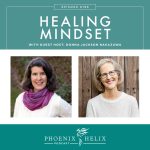
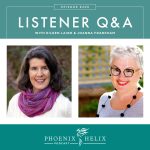
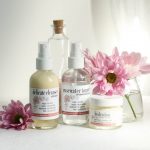

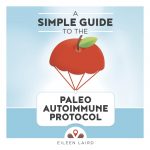

Thank you so much for this great post on autoimmune skin conditions.
Hidradenitis suppurativa, runs in my family – 6 of us suffer from this – so I believe there is a definite heritary component as well as autoimmune. Also another family member suffers from eczema and another branch of my family suffers from a more serious skin condition call EB (Epidermolysis Bullosa).
It took us decades to be diagnosed and until my son was diagnosed in NY by a dermatologist none of us knew this was autoimmune. My HS started when I was age 12-13 (with chronic sties and bacterial skin infections.) It took me until me mid-60’s to diagnose this – 50 years of pain and chronic infections!
This means that I have had repetitive antibiotics prescribed most all of my life. Bad news certainly!
I have found that AIP (that I began primarily for Autoimmune Thyroiditis) and this has also helped my skin situation considerably. My infections have greatly lessened during the last 18-19 months that I have been compliant with this protocol. At stage 2, and I rarely was able to go more than three months without an infection so this improvement has been like a miracle for me.
I recently had a huge flare (I presume from family stress) and this sent me back to my FMP for additional medical options.
I want to share this pertinent information with your listeners as well:
I work with a good FMP and I have started a new fairly experimental treatment as well. I am currently having Major Auto Hemotherapy IV therapy using Ozone. This works by drawing out a pint of my blood, mixing in medical grade Ozone and putting it back into me. This serves to kill off virus, bacteria, and other pathogens. I am four weeks into a ten week treatment session and I am hopeful this protocol will continue to help. I take two sessions per week for 10 weeks, or a total of 20 IV sessions.
I shared your post cast with my son, my brother and my friend with rosacea. Thank you as always for the work that you do.
Please note that my HS does have a bacterial infection component. Fluids have been drawn from my infections and Staph is usually present.
Hi Donna. Thanks for sharing your story. It’s interesting that Joanna also said that she had family members with other autoimmune skin conditions and also sees that genetic link.
Sauerkraut is high in sulphur, btw.
Hi Joseph, we add probiotic bacteria to our sauerkraut or pickles by adding GutPro probiotic powder to the brine as we are making it so we get lots of bifidobacterium growing in it. If you do the same, please be careful not to ferment a probiotic supplement with soil based bacteria in it. My understanding of the content of sauerkraut probiotics is that there is an abundance of lactobacillus plantarum. There are certainly others, but this particular species appears to be I abundance in sauerkraut.
hi Susan if i may ask you say thats “probiotic foods with bifidobacterium, not so much lactobacillus bacterium.”
would homemade fermented kraut or pickles which is a probiotic, produce bifidobacterium? or its mostly Lacto bacteria?
I have recovered from rheumatoid arthritis, chronic fatigue, fibromyalgia, colitis/Crohn’s disease and Hashimotos. My husband has recovered from ankylosing spondylitis and my son has recovered from autism. After the experience of our own recovery, I chose to study holistic nutrition as I would love to see others reverse their own symptoms and suffering. It is wonderful to hear of the success stories on your podcasts as it highlights the many others who are recovering from symptoms of chronic illness.
How inspiring, Susan! Wishing you and your family continued health.
I am finding that many people who have an infection from sulphur reducing bacteria causes many of the autoimmune skin disorders. So eliminating foods that are higher in sulphur such as eggs and nuts help many people. However, these bacterium also thrive on sugar. Gradually changing the gut biome with probiotic foods with bifidobacterium, not so much lactobacillus bacterium.
Fascinating! Are you a healthcare practitioner, Susan?
I have loved all of your podcast episodes! I have had narcolepsy since about age 12 (but not accurately diagnosed until age 28) and have been using diet and lifestyle changes for the last 2 years to improve my health. I’m almost 33 and narcolepsy symptoms still affect me on a daily basis but things are improving slowly but surely. I need to keep myself motivated and inspired and your podcast does this for me. Thanks!
I’m so glad they’re improving, Lori, and that the podcast helps! May you keep feeling better and better.
Another fantastic podcast, Eileen! It makes me so happy to see new episodes in my inbox! Although I don’t have AI skin issues, the advice shared in this episode still applies to the inflammatory arthritis and thyroid symptoms I experience. I wholeheartedly agree with your guests that stress may be the number one factor that negatively triggers AI responses. In fact, I would venture to say that it is at the root of most disease processes. I dedicated a chapter to this subject in my book, although I know I could’ve written much more on the topic of stress. I can’t prove that stress caused my breast cancer in 2006 (with no family history), but I can say with certainty that it provided an environment for it to grow and flourish! The topic of self-love also hit home as I listened to this podcast. This is something that seems to elude (especially women) people with AI disease. I refer to it as nourishing the soul. Whether that means doing something you love (every day!), eating/cooking together as a family or with friends, mindful eating or quiet time, it’s vital to feed our souls so we can heal, and extend love to others. Another thing I believe women struggle with is giving ourselves permission to heal – to do the things, or not do things, that are essential to our healing. As caretakers, we tend to put ourselves last. We didn’t get sick over night, so we must realize that the road to wellness may take some time and that it’s perfectly acceptable (and necessary) to cut ourselves some slack, eat well, sleep more, say no, be still, exercise less (or more, or not at all, or differently than we are used to), etc. Again, I love your show and share your passion for helping people be well and live well. Thank you for the positive impact you are making in the AIP community! 🙂
Thanks for writing, Jeanne. There’s so much wisdom in your comment. I especially love the phrase “nourishing the soul.”
Love this, thank you so much for the opportunity, Eileen!
It was a pleasure to have you on the show, Mary.
Eileen – thanks again for including me in your latest podcast. It was wonderful connecting with both you and Mary about skin issues and autoimmunity. I often think how different life would have been if I’d known twenty years ago, what I know now about the effects my dietary and lifestyle choices have on my health…! But then, I probably would never have met you!
It was such a pleasure having you on the show, Joanna.
Great podcast! Thank you, everyone, for sharing your experiences and suggestions. I’ve been able to get my psoriasis, rosacea, and seborrheic dermatitis under good control with AIP Paleo, but I’m still having major problems with my lichen planus.
I’ve had chronic severe insomnia (averaging under 5 hours/night), despite darkening my room and following many other suggestions. I’ve recently started an online cognitive behavioral therapy program for insomnia (http://SHUTi.me), and I’m finally starting to improve – though I still have a long way to go.
I’ve recently realized that I also have histamine issues. I’m struggling emotionally to cope with this, as I simply don’t want yet another thing to deal with! {sigh…}
Hi Debra. I understand that frustration. The good news is that with healing, histamine issues often get better. Thanks for sharing that insomnia resource. Wishing you healing on every level!
Another great show Eileen! Even if the topic is not directly related to my condition, Autoimmunity is autoimmunity and I always gain pearls of wisdom and new resources from you and your guests for my own personal healing journey. Thanks!
My pleasure, Cati! I feel the same way.